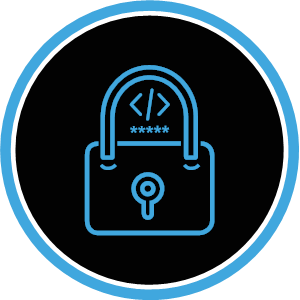
CodeLock continuously monitors software at the code level. CodeLock™ discloses an insertion attack within milliseconds from its occurrence and instantly identifies where that incursion occurred (saving companies and organizations millions per incident). CodeLock™ completely eliminates any-and-all threats of intrusion-based malware and can stop cyberattacks from even the most sophisticated hostile nation-states.
Bold statements?
We know! But that’s not our opinion; it’s an unprecedented endorsement from the U.S. Department of Homeland Security (DHS). CodeLock™ has already received similar praise from the CISOs of major software companies, members of a select committee of the UN Security Council, and leading computer forensic investigators.
How?
CodeLock™ creates an inviolable network of security sensors that can be embedded into any software running on your servers. The CodeLock™ algorithm inserts specialized “digital signatures” at predetermined locations throughout an entire body of code – effectively creating containers of code that are then sealed, signed, and linked together in a Blockchain like structure.
Through this simple process, CodeLock™ infallibly protects every line of code you produce. From small utility functions to multi-million-character operating systems, CodeLock™ keeps your software safe.
Consider this… Approximately $60 billion is spent annually on cybersecurity to keep hackers out. But CodeLock™ is the only technology that automates the process of detecting malware once it has gotten past your perimeter.
Bold statements?
We know! But that’s not our opinion; it’s an unprecedented endorsement from the U.S. Department of Homeland Security (DHS). CodeLock™ has already received similar praise from the CISOs of major software companies, members of a select committee of the UN Security Council, and leading computer forensic investigators.
How?
CodeLock™ creates an inviolable network of security sensors that can be embedded into any software running on your servers. The CodeLock™ algorithm inserts specialized “digital signatures” at predetermined locations throughout an entire body of code – effectively creating containers of code that are then sealed, signed, and linked together in a Blockchain like structure.
Through this simple process, CodeLock™ infallibly protects every line of code you produce. From small utility functions to multi-million-character operating systems, CodeLock™ keeps your software safe.
Consider this… Approximately $60 billion is spent annually on cybersecurity to keep hackers out. But CodeLock™ is the only technology that automates the process of detecting malware once it has gotten past your perimeter.
Employees: 11-50
Founded date: 2021
Investors 1
| Date | Name | Website |
| 17.10.2022 | SGH Capita... | sghcapital... |
Mentions in press and media 4
| Date | Title | Description |
| 09.01.2025 | CodeLock Unveils Groundbreaking Patent to Transform Software Security | CodeLock’s New Patent Sets a Bold Standard for Securing the Global Software Supply Chain After SolarWinds, we vowed to secure software—today, we deliver on that promise with a patented solution, safeguarding organizations' software supply c... |
| 29.08.2023 | TechCrunch Disrupt 2023 Startup Battlefield 200: AI and Security edition | After months of vetting thousands of applications, the Startup Battlefield 200 (SB 200) cohort for TechCrunch Disrupt 2023 is complete. You do not want to miss this incredible, curated collection of early-stage startups you’ll find exhibiti... |
| 24.05.2022 | Here are all of the companies presenting at Alchemist Accelerator’s 30th Demo Day today | It’s Demo Day time! Today marks the 30th Demo Day for Alchemist, the enterprise-focused accelerator that helped grow companies like LaunchDarkly, Rigetti Computing and Privacera early on. As an enterprise accelerator, the companies Alchemis... |
| 05.10.2021 | Here are the 23 companies pitching at Alchemist Accelerator’s Demo Day XXVIII today | It’s that time again! Today is the 28th Demo Day for Alchemist, an accelerator that primarily focuses on enterprise companies — or those that sell to other companies, primarily, rather than directly to consumers. This latest cohort comes in... |